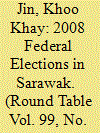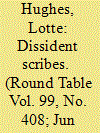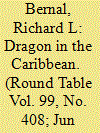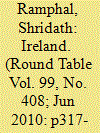|
|
|
Sort Order |
|
|
|
Items / Page
|
|
|
|
|
|
|
| Srl | Item |
| 1 |
ID:
096823


|
|
|
|
|
| Publication |
2010.
|
| Summary/Abstract |
In the aftermath of the 8 March elections, Sarawak was cast as an outlier, recalcitrant even, to the perceived 'revolt' against the incumbent Barisan Nasional. This short note attempts to show that Sarawak actually fell within the overall voting pattern viewed in its total range, rather than in summary outcomes. In that context, the note then attempts to argue that the voting patterns can be accounted for by local reasons, hopes and fears, particularly in the case of the minority indigenous groups collectively categorised as 'Other bumiputera'. However, Chinese and Malay constituencies exhibited a pattern clearly correlated to ethnicity.
|
|
|
|
|
|
|
|
|
|
|
|
|
|
|
|
| 2 |
ID:
096822


|
|
|
|
|
| Publication |
2010.
|
| Summary/Abstract |
Despite a growing body of work on anti-colonialist movements and the activities of individual activists, there remain large gaps in our knowledge of early agitation in and around Africa, and the links between people. A scholarly focus on transnational networking in the 1930s to 1950s tends to overshadow earlier agitation, by people whose achievements are too often forgotten now, but who laid the foundations for later struggle, decolonisation, and modern-day humanitarian activity. This article discusses some lesser-known agitators, both European and African, active in Africa in the 1900s (though Colenso began earlier), who used copious correspondence, the press and humanitarian networks to highlight colonial abuses and challenge imperial policy. It focuses largely on, and draws parallels between, Dr Norman Leys (working in East Africa), Henry Nevinson (West Africa), F. Z. S. Peregrino (West and South Africa) and Harriette Colenso (South Africa).
|
|
|
|
|
|
|
|
|
|
|
|
|
|
|
|
| 3 |
ID:
096824


|
|
|
|
|
| Publication |
2010.
|
| Summary/Abstract |
In recent years the People's Republic of China (China) has expanded its economic relations with CARICOM (the member states of CARICOM are Antigua and Barbuda, The Bahamas, Barbados, Belize, Dominica, Grenada, Guyana, Haiti, Jamaica, St Kitts and Nevis, St Lucia, St Vincent and the Grenadines, Suriname and Trinidad and Tobago). This is evident in the increase in trade and development assistance. The objective of this article is to explain the expanded and intensified economic presence of China in the CARICOM region. In order to accomplish this it is necessary to identify the motives for China's conduct in the region and the factors that account for the receptivity of CARICOM to economic relations with China. Although the focus is primarily on the economic relationship between China and the CARICOM countries, this aspect of China's involvement in the region cannot be separated from the political dimension. China's motives for a growing presence in the region are both economic and political and have to be examined in the wider context of China's overall foreign policy, its shifting world view, its superpower status and the geo-politics of the current global conjuncture. Similarly, CARICOM's conduct has to be located in the wider context of its overall foreign policy. The first section outlines the history and current status of China-CARICOM relations. This is followed by an exposition of the extent and increase in economic interaction between China and CARICOM. The third section provides an examination of China's motives for the conduct of its foreign policy in the CARICOM countries. These motives are partly influenced by economics and partly by politics and hence have to be understood in the global geo-political context. A fourth section is devoted to explaining CARICOM's receptivity to increased economic relations with China. The final section provides a brief outlook for China-CARICOM economic relations.
|
|
|
|
|
|
|
|
|
|
|
|
|
|
|
|
| 4 |
ID:
096827


|
|
|
|
|
| Publication |
2010.
|
| Summary/Abstract |
The 2009 Commonwealth Heads of Government Meeting has inaugurated another High-level Review of the Commonwealth and an Eminent Persons Group. This article considers previous reviews and the potential and prospects of this latest one. It reports on the Round Table Centenary Conference held at Cumberland Lodge in January 2010, which was devoted to a critical study of Commonwealth institutions and processes.
|
|
|
|
|
|
|
|
|
|
|
|
|
|
|
|
| 5 |
ID:
096826


|
|
|
|
|
| Publication |
2010.
|
| Summary/Abstract |
This article argues that, as the modern Commonwealth celebrates its 60th anniversary, the time has come for Ireland-which left the organisation in April 1949 baulking at the prospect of 'allegiance' to the British Crown-to return to the fold, now that Republican constitutions are common among Commonwealth members and new entrants, without historic links with Britain and the Crown, have been welcomed in.
|
|
|
|
|
|
|
|
|
|
|
|
|
|
|
|
| 6 |
ID:
096825


|
|
|
|
|
| Publication |
2010.
|
| Summary/Abstract |
How do national and political identities impact on a state's foreign policy? In turn, how does the analysis of different normative beliefs advance our understanding of India's foreign policy during the National Democratic Alliance (NDA) period? This article utilises a norm-based approach to investigate the composite entrenched beliefs underpinning Indian foreign policy. Such an approach generates historically contingent understandings of foreign policy beliefs across different political generations and ideologies. By focusing on pre-1998 Indian government and Bharatiya Janata Party (BJP) foreign policy norms, and comparing them with the actions of the BJP-led NDA in government, the paper assesses whether differing ideological beliefs either constrain or influence (Indian) foreign policy. In particular, two elements of Indian foreign policy are analysed-dealing with Pakistan and going nuclear-in order to evaluate continuity and change in the formation and development of foreign policy in India. It is found that although the BJP-led NDA were frequently constrained by underlying norms present in Indian foreign policy, their own established policy beliefs often challenged these norms and influenced new foreign policy directions.
|
|
|
|
|
|
|
|
|
|
|
|
|
|
|
|
|
|
|
|
|